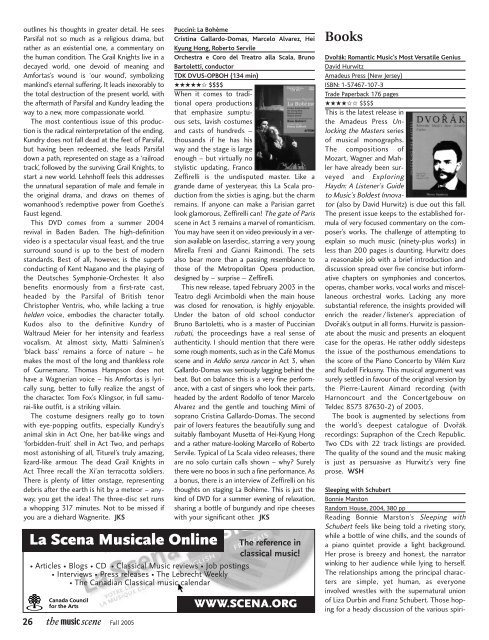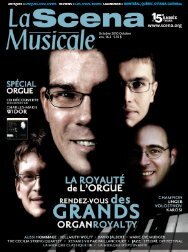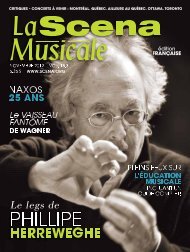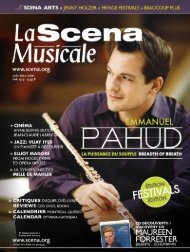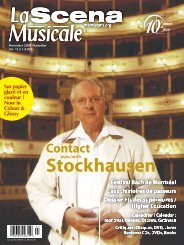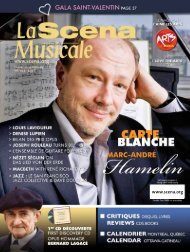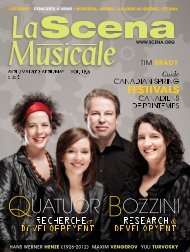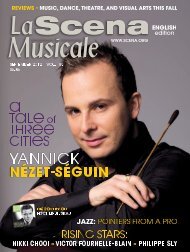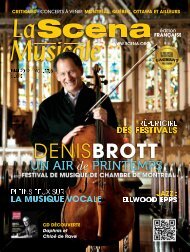Download - La Scena Musicale
Download - La Scena Musicale
Download - La Scena Musicale
Create successful ePaper yourself
Turn your PDF publications into a flip-book with our unique Google optimized e-Paper software.
outlines his thoughts in greater detail. He sees<br />
Parsifal not so much as a religious drama, but<br />
rather as an existential one, a commentary on<br />
the human condition. The Grail Knights live in a<br />
decayed world, one devoid of meaning and<br />
Amfortas’s wound is ‘our wound’, symbolizing<br />
mankind’s eternal suffering. It leads inexorably to<br />
the total destruction of the present world, with<br />
the aftermath of Parsifal and Kundry leading the<br />
way to a new, more compassionate world.<br />
The most contentious issue of this production<br />
is the radical reinterpretation of the ending.<br />
Kundry does not fall dead at the feet of Parsifal,<br />
but having been redeemed, she leads Parsifal<br />
down a path, represented on stage as a ‘railroad<br />
track’, followed by the surviving Grail Knights, to<br />
start a new world. Lehnhoff feels this addresses<br />
the unnatural separation of male and female in<br />
the original drama, and draws on themes of<br />
womanhood’s redemptive power from Goethe’s<br />
Faust legend.<br />
This DVD comes from a summer 2004<br />
revival in Baden Baden. The high-definition<br />
video is a spectacular visual feast, and the true<br />
surround sound is up to the best of modern<br />
standards. Best of all, however, is the superb<br />
conducting of Kent Nagano and the playing of<br />
the Deutsches Symphonie-Orchester. It also<br />
benefits enormously from a first-rate cast,<br />
headed by the Parsifal of British tenor<br />
Christopher Ventris, who, while lacking a true<br />
helden voice, embodies the character totally.<br />
Kudos also to the definitive Kundry of<br />
Waltraud Meier for her intensity and fearless<br />
vocalism. At almost sixty, Matti Salminen’s<br />
‘black bass’ remains a force of nature – he<br />
makes the most of the long and thankless role<br />
of Gurnemanz. Thomas Hampson does not<br />
have a Wagnerian voice – his Amfortas is lyrically<br />
sung, better to fully realize the angst of<br />
the character. Tom Fox’s Klingsor, in full samurai-like<br />
outfit, is a striking villain.<br />
The costume designers really go to town<br />
with eye-popping outfits, especially Kundry’s<br />
animal skin in Act One, her bat-like wings and<br />
‘forbidden-fruit’ shell in Act Two, and perhaps<br />
most astonishing of all, Titurel’s truly amazing,<br />
lizard-like armour. The dead Grail Knights in<br />
Act Three recall the Xi’an terracotta soldiers.<br />
There is plenty of litter onstage, representing<br />
debris after the earth is hit by a meteor – anyway,<br />
you get the idea! The three-disc set runs<br />
a whopping 317 minutes. Not to be missed if<br />
you are a diehard Wagnerite. JKS<br />
<strong>La</strong> <strong>Scena</strong> <strong>Musicale</strong> Online<br />
26 Fall 2005<br />
Puccini: <strong>La</strong> Bohème<br />
Cristina Gallardo-Domas, Marcelo Alvarez, Hei<br />
Kyung Hong, Roberto Servile<br />
Orchestra e Coro del Treatro alla Scala, Bruno<br />
Bartoletti, conductor<br />
TDK DVUS-OPBOH (134 min)<br />
★★★★★✩ $$$$<br />
When it comes to traditional<br />
opera productions<br />
that emphasize sumptuous<br />
sets, lavish costumes<br />
and casts of hundreds –<br />
thousands if he has his<br />
way and the stage is large<br />
enough – but virtually no<br />
stylistic updating, Franco<br />
Zeffirelli is the undisputed master. Like a<br />
grande dame of yesteryear, this <strong>La</strong> Scala production<br />
from the sixties is aging, but the charm<br />
remains. If anyone can make a Parisian garret<br />
look glamorous, Zeffirelli can! The gate of Paris<br />
scene in Act 3 remains a marvel of romanticism.<br />
You may have seen it on video previously in a version<br />
available on laserdisc, starring a very young<br />
Mirella Freni and Gianni Raimondi. The sets<br />
also bear more than a passing resemblance to<br />
those of the Metropolitan Opera production,<br />
designed by – surprise – Zeffirelli.<br />
Thisnew release, taped February 2003 in the<br />
Teatro degli Arcimboldi when the main house<br />
was closed for renovation, is highly enjoyable.<br />
Under the baton of old school conductor<br />
Bruno Bartoletti, who is a master of Puccinian<br />
rubati, the proceedings have a real sense of<br />
authenticity. I should mention that there were<br />
some rough moments, such as in the Café Momus<br />
scene and in Addio senza rancor in Act 3, when<br />
Gallardo-Domas was seriously lagging behind the<br />
beat. But on balance this is a very fine performance,<br />
with a cast of singers who look their parts,<br />
headed by the ardent Rodolfo of tenor Marcelo<br />
Alvarez and the gentle and touching Mimi of<br />
soprano Cristina Gallardo-Domas. The second<br />
pair of lovers features the beautifully sung and<br />
suitably flamboyant Musetta of Hei-Kyung Hong<br />
and a rather mature-looking Marcello of Roberto<br />
Servile. Typical of <strong>La</strong> Scala video releases, there<br />
are no solo curtain calls shown – why? Surely<br />
there were no boos in such a fine performance. As<br />
a bonus, there is an interview of Zeffirelli on his<br />
thoughts on staging <strong>La</strong> Bohème. This is just the<br />
kind of DVD for a summer evening of relaxation,<br />
sharing a bottle of burgundy and ripe cheeses<br />
with your significant other. JKS<br />
The reference in<br />
classical music!<br />
• Articles • Blogs • CD • Classical Music reviews • Job postings<br />
• Interviews • Press releases • The Lebrecht Weekly<br />
• The Canadian Classical music calendar<br />
WWW.SCENA.ORG<br />
Books<br />
Dvořák: Romantic Music’s Most Versatile Genius<br />
David Hurwitz<br />
Amadeus Press (New Jersey)<br />
ISBN: 1-57467-107-3<br />
Trade Paperback 176 pages<br />
★★★★✩✩ $$$$<br />
This is the latest release in<br />
the Amadeus Press Unlocking<br />
the Masters series<br />
of musical monographs.<br />
The compositions of<br />
Mozart, Wagner and Mahler<br />
have already been surveyed<br />
and Exploring<br />
Haydn: A Listener’s Guide<br />
to Music’s Boldest Innovator<br />
(also by David Hurwitz) is due out this fall.<br />
The present issue keeps to the established formula<br />
of very focused commentary on the composer’s<br />
works. The challenge of attempting to<br />
explain so much music (ninety-plus works) in<br />
less than 200 pages is daunting. Hurwitz does<br />
a reasonable job with a brief introduction and<br />
discussion spread over five concise but informative<br />
chapters on symphonies and concertos,<br />
operas, chamber works, vocal works and miscellaneous<br />
orchestral works. <strong>La</strong>cking any more<br />
substantial reference, the insights provided will<br />
enrich the reader / listener’s appreciation of<br />
Dvořák’s output in all forms. Hurwitz is passionate<br />
about the music and presents an eloquent<br />
case for the operas. He rather oddly sidesteps<br />
the issue of the posthumous emendations to<br />
the score of the Piano Concerto by Vilém Kurz<br />
and Rudolf Firkusny. This musical argument was<br />
surely settled in favour of the original version by<br />
the Pierre-<strong>La</strong>urent Aimard recording (with<br />
Harnoncourt and the Concertgebouw on<br />
Teldec 8573 87630-2) of 2003.<br />
The book is augmented by selections from<br />
the world’s deepest catalogue of Dvořák<br />
recordings: Supraphon of the Czech Republic.<br />
Two CDs with 22 track listings are provided.<br />
The quality of the sound and the music making<br />
is just as persuasive as Hurwitz’s very fine<br />
prose. WSH<br />
Sleeping with Schubert<br />
Bonnie Marston<br />
Random House, 2004, 380 pp<br />
Reading Bonnie Marston’s Sleeping with<br />
Schubert feels like being told a riveting story,<br />
while a bottle of wine chills, and the sounds of<br />
a piano quintet provide a light background.<br />
Her prose is breezy and honest, the narrator<br />
winking to her audience while lying to herself.<br />
The relationships among the principal characters<br />
are simple, yet human, as everyone<br />
involved wrestles with the supernatural union<br />
of Liza Durbin and Franz Schubert. Those hoping<br />
for a heady discussion of the various spiri-


